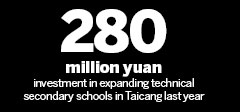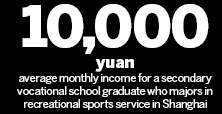The road to life after education
Updated: 2013-09-23 10:53
By Shi Jing and He Wei (China Daily)
|
|||||||||||
 |
|
Students prepare for a flight attendant excercise during a professional skills competition for vocational schools in Shanghai. Wang Biao/For China Daily |



A slowing Chinese economy has fueled concern among many colleges for students' job prospects, but the principal of Chengdu Modern Vocational School has no such worries about her graduates.
July was a rewarding month for Chen Min, whose institute has registered a 100 percent employment rate for five consecutive years, with one-third of graduates securing one or more job offers six months before obtaining their diplomas.
On a typical humid summer afternoon in Chengdu, the fastest developing growth engine in western China, a group of apprentices, aged between 16 and 18, were starting a hairdressing journal, filled with jargon used in the trade.
By engaging them in heated discussion on the basic knowledge behind a certain hairstyle, Chen said the school is able to free students from a stereotyped, rigid curriculum, encourage them to "think outside the box" and to gain more hands-on experience in hair salons.
An education veteran, she has long seen vocational education's value in training skilled workers, tapping emerging-market needs and improving the employment rate.
By signing a Memorandum of Understanding with Northern Melbourne Institute (NMIT), one of Australia's leading vocational training institutes, Chen expects to take her school to the forefront of the vocational education arena, and for this model to benefit the vast majority in China.
The key to the partnership is to introduce internationally recognized courses to local students, and in the case of NMIT-Chengdu collaboration, it is the Technical and Further Education (TAFE) standard that is widely perceived as a prerequisite for qualified vocational training.
Dino Bettiol, executive director in charge of NMIT's international program, says the Chinese system for vocational education and training in upper secondary schools has great strengths - it builds on a robust basis of universal basic schooling and rapid growth in educational aspirations and attainment.
About 2,000 km east of Chengdu is Taicang in Jiangsu province, known for its complete vocational education system.
Zhou Xinyuan, president of Jiangsu Taicang Secondary Vocational School, said a graduate from his school who majored in recreational sports service and management landed a job in Shanghai in June managing fitness equipment in residential communities. Her after-tax salary is as much as 17,000 yuan ($2,765) a month, while the average for university graduates in Shanghai is just 4,000 yuan before tax.
Related Stories
Foreigners at Zibo Vocational Institute celebrate coming festival 2013-09-18 14:35
China, ASEAN to develop vocational education 2013-09-05 10:07
Employment of vocational graduates above 96% 2013-08-30 10:32
Tai'an offers free vocational training to poverty-stricken students 2013-08-28 15:14
China to develop vocational education for farmers 2013-07-23 12:18
Employment rate of vocational graduates up slightly 2013-07-16 17:09
Today's Top News
Mission to moon will boost research, awareness
China-Germany relations stable
Verdict for Bo Xilai: Life in prison
Russian embassy to Syria shelled
Gunmen holding hostages in Nairobi
Trending News across China
Amber alert across Asia, but not red
China signs 12 deals with Venezuela
Hot Topics
Lunar probe , China growth forecasts, Emission rules get tougher, China seen through 'colored lens', International board,
Editor's Picks

|

|

|

|

|

|





